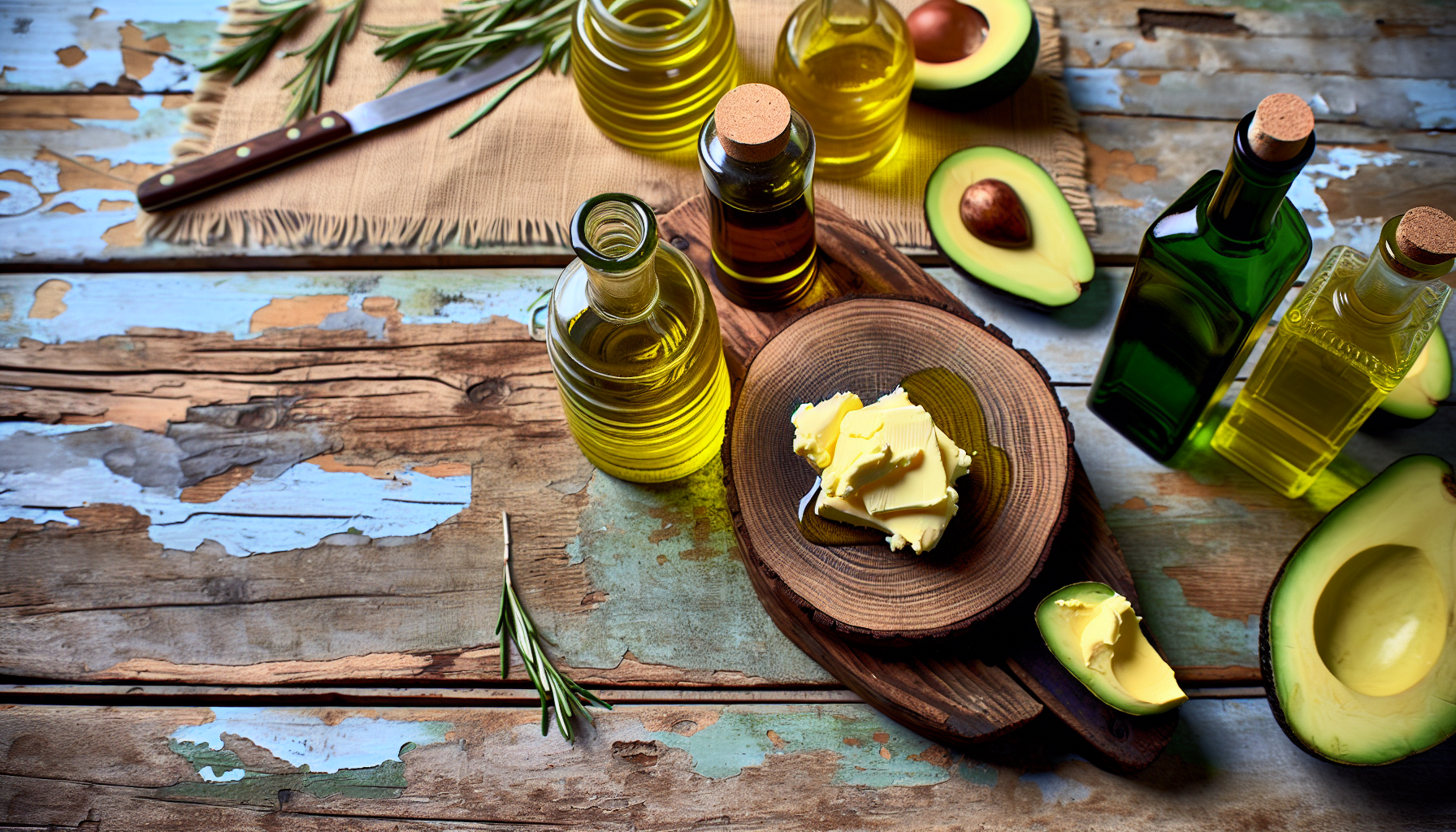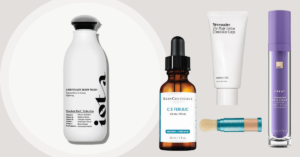This post may contain affiliate links, which means I’ll receive a commission if you purchase through my link, at no extra cost to you. Please read full disclosure: here.
Debating the healthiness of seed oils?
You’re not alone.
I’ve recently gone down the rabbit hole of different conspiracies related to the vast increase in chronic illnesses, obesity, and the overall decline in optimal wellness, specifically here in the United States and other Western nations.
In an era where every fat is scrutinized, canola, sunflower, and soybean oil stand at the crossroads of nutrition science Dr Paul Saladino was one of very few doctors who seemed to be offering honest and eye-opening medical data and resources that contradict most Western medical ideologies.
This article uncovers whether these oils deserve their place in our pantries or if health concerns related to omega-6 fatty acids warrant a second look.
We turned to Dr. Paul Saladino for an alternative perspective to help us understand the surprising benefits of animal-based fats and the associated reduced risk of cardiovascular events as well as his take on the health concern regarding seed oils.
Editor’s Note: While we hope you enjoy reading this article, please note that the content provided in this article is for information purposes only and is not a substitute for professional advice or medical treatment. The opinions and content included in the article are the views of the creator or author only.
Key Takeaways
-
Per the guidance of Dr. Paul Saladino, evidence suggests that seed oils like canola, sunflower, and soybean oil are high in omega-6 fatty acids, which can lead to an imbalance of omega-6 to omega-3 ratio in the diet, potentially causing inflammation and chronic diseases in human health.
-
The extraction methods of seed oils, particularly solvent extraction using hexane, may lead to the loss of beneficial compounds and the formation of trans fats and other harmful compounds, further contributing to health risks.
-
While seed oils are prevalent in processed foods, opting for whole foods, grass-fed butter, or unrefined oils, increasing intake of omega-3-rich foods, and reducing consumption of ultra-processed foods while also trying to avoid seed oils can lead to optimal health outcomes.
Seed Oils: The Basics

Seed oils, derived from plants’ seeds and a crucial component of our diets, are commonly used in households and commercial food production.
Canola oil, sunflower oil, soybean oil, and rice bran oil are popular examples of these cooking oils known for their neutral taste profile, long shelf life span, and long shelf life.
Common Seed Oils
Some commonly used seed oils are canola oil, sunflower oil, soybean oil, and rice bran oil.
These oils have a high smoke point which makes them suitable for various cooking methods such as frying.
It is important to note that they contain significant amounts of polyunsaturated fatty acids (PUFAs), specifically linoleic acid – an omega-6 fatty acid.
While omega-6 fatty acids play a crucial role in our health, an imbalanced ratio of omega-3 to omega-6 in our diet may lead to certain health issues.
Unfortunately, modern diets often include excessive consumption of these PUFAs from common seed oils like cottonseed oil or corn oil alongside the previously mentioned ones: grapeseed and safflower oils.
It should be noted that this concern goes beyond just the four commonly used seeds above.
Other types, including those listed earlier, also contribute towards disrupting this balance due to their high content of linoleic acid – one type among many others present within each particular kind.
Extraction Methods
The extraction of seed oils is a complex process that can involve the use of mechanical pressing, chemical solvents, or a combination of both techniques.
The selection depends on the type and intended purpose of the seeds. For example, for certain types of soybeans, efficient solvent extraction methods utilizing hexane are often employed to reduce oil content in extracted flakes to 1% or less.
On the other hand, processes like continuous full pressing and hydraulic pressing may be preferred for their ability to preserve nutrients by using low temperatures during stages such as rolling, conditioning and actual press.
Although widely used due to its high efficiency rate, the solvent-based method typically involves higher temperatures which can cause loss of beneficial compounds found in these oils.
Examining health impacts calls for careful consideration when choosing between different refining processes.
Seed Oils Causing Serious Health Issues

Seed oils have been linked to various health concerns, primarily due to their high levels of omega-6 fatty acids.
This can create an inflammatory environment in the body and potentially lead to chronic diseases if consumed excessively.
There is a growing concern about the imbalance between our intake of omega-6 and omega-3 fatty acids, which may increase the risk of long-term illnesses.
Another issue with seed oils is their processing or hydrogenation process, which can result in harmful substances such as trans fats being formed.
These compounds not only raise cholesterol levels but also trigger inflammation, exacerbating potential health risks.
Additives and lipid oxidation products found in frying oils are known for causing cell damage and increasing susceptibility to certain types of cancer.
Despite ongoing debates on this topic, it should be noted that conclusive evidence regarding the direct impact seed oils have on one’s well-being remains unclear.
However,the negative effects associated with excessive consumption cannot be ignored, especially when considering factors such as elevated blood cholesterol levels caused by trans fats formation during processing or cooking methods using frying oil containing LOP additives, among others.
Imbalance of Omega-6 and Omega-3 Fatty Acids
In the past, our diet typically had a ratio of omega-6 to omega-3 fatty acids around 4:1.
In today’s Western diet, this balance has been distorted, and ratios can range from as high as 20:1 or even up to 75:1.
This significant increase in consumption of omega-6 fatty acids can raise the risk of chronic low-grade inflammation and also have an impact on immune responses.
Both Omega-6 and Omega -3 are essential precursors for lipid mediators that play crucial roles in metabolism and inflammatory processes.
Nevertheless, if there is an imbalance between these two types of fatty acids, it may result in more pro-inflammatory reactions occurring within the body.
To address this issue, nutrition experts advise increasing the intake of foods rich in omega-3, like seafood, or incorporating algal oil supplements into one’s daily routine.
Oxidation and Formation of Harmful Compounds
Seed oils, containing polyunsaturated fats, are prone to oxidation when exposed to heat during cooking.
This results in the production of harmful compounds like aldehydes, which can increase one’s risk for diseases such as cancer.
The process of oxidation occurs through a reaction between fatty acids and oxygen present in the atmosphere, leading to primary products that may eventually break down into secondary toxic substances.
Regular consumption of oxidized oils can cause oxidative stress within our bodies and contribute to chronic conditions, including atherosclerosis and Alzheimer’s disease.
Several factors, such as levels of unsaturation in fatty acids, storage methods, and the presence of metals, affect the rate at which oil oxidizes, resulting in varying amounts of harmful compounds produced.
Therefore, it is crucial to take these variables into account when using seed oils for cooking purposes.
The Dangers of Seed Oils

The potential health risks associated with seed oils, particularly those containing high levels of linoleic acid, have been a topic of debate in the scientific community.
Dr. Paul Saladino, a well-known figure in the field of healthcare, argues that these oils are not suitable for human consumption and may contribute to chronic diseases.
According to him, excess linoleic acid can build up in the body and cause damage to fat cells through chronic inflammation and DNA damage.
Dr. Saladino recommends saturated fats from ethically raised animals as the most appropriate source for humans instead of processed foods or corn/soy-fed animals, which also contain high amounts of linoleic acid.
Nutrient Content in Unrefined Seed Oils
Despite ongoing examination of the impact of vegetable oils on health, it is noteworthy that unrefined versions contain valuable substances like vitamin E and phenolic compounds.
These beneficial components are often lost when refining vegetable oils through methods such as bleaching and deodorizing.
Unrefined seed oils, rich in crucial antioxidant vitamin E, play a role in protecting against oxidation and promoting overall well-being.
They retain their natural taste, scent, and other advantageous elements like plant sterols which can be eliminated during refinement.
This highlights the importance of making informed decisions about our oil consumption to reap potential health benefits from choosing unrefined options over refined ones.
Navigating the Seed Oil Landscape: Making Healthier Choices
While understanding the seed oil landscape may be complex, staying informed can aid in making healthier decisions.
It’s not just about avoiding seed oils but more about choosing nutrient-rich and omega-3-abundant alternatives.
This approach can help balance the omega-6 to omega-3 ratio in our diets and contribute to better health outcomes.
Dr. Saladino advocates for a diet free of seed oils and high in saturated fats from well-raised animals.
He believes that the removal of excess linoleic acid from our diets is the most crucial step to thriving health.
While this perspective may not align with everyone’s dietary preferences or principles, it emphasizes the need for a more balanced intake of fats in our diets.
Opting for Grass-Fed Butter and Unrefined Oils

When it comes to choosing oils for your diet, opting for healthier alternatives instead of traditional seed oils can have many benefits.
One of the best cooking options is grass-fed butter, and other secondary alternatives such as unrefined oils like extra virgin olive oil, avocado oil, and coconut oil provide a richer source of nutrients without contributing to the omega-6 to omega-3 imbalance commonly found in modern diets and seed oils.
It’s important not only to consider the type of oil but also how it is extracted. For example, using Ncold press eliminates chemicals, solvents, and preservatives from the process, which helps preserve both nutritional quality and antioxidant properties present in these healthy oils.
This sustainable approach minimizes waste production while also consuming less energy compared with heat-based extraction methods.
Incorporating Omega-3-Rich Oils
Including oils rich in omega-3, such as grass-fed butter, can have a positive impact on our eating habits.
As Dr. Saladino explains, cooking with and eating grass-fed butter is surprisingly known to lower the risk of heart disease and is highly recommended for maintaining a well-balanced diet.
While refined seed oils may be more commonly used in food production due to their mild taste profile and high smoke points, incorporating omega-3-rich grass-fed butter alternatives offers numerous health benefits.
Seed Oils in Processed Foods
Vegetable oils, also known as seed oils, are commonly utilized in processed foods due to their widespread availability.
One of the most heavily used vegetable oils is soybean oil, which makes up more than 60% of all vegetable oil consumed in American diets.
Soybean oil can be found in a variety of food products, such as infant formula and salad dressings.
Similarly, another common additive found in many processed foods is genetically modified canola oil.
The consumption of ultra-processed foods that contain additives like seed oils may increase the risk of chronic health conditions.
Examples of unhealthy ultra-processed foods include packaged snacks like cookies and chips, fast food meals high in fat and sodium content, snacks loaded with artificial sweeteners, frozen meals, and processed meats.
There appears to be a correlation between relying too heavily on these highly refined ultra-processed options and an escalation in cases of long-term health issues.
Some other well-known examples associated with increased risks include obesity and cardiovascular disease, brought about by consuming excessive amounts of fast food, prefabricated desserts, and sugary beverages.
Seed oils contained within various processed foods could help individuals make informed choices when it comes to their dietary habits.
Identifying Hidden Seed Oils
It is important for consumers to carefully read labels when trying to detect hidden seed oils in processed foods.
They should be on the lookout for terms like ‘vegetable oil’ and specific names such as canola, corn, cottonseed, grapeseed, soybean, sunflower, safflower or rice bran oil listed among the ingredients.
Even products marketed as ‘healthy’, including protein bars and granola items, may contain these types of oils which makes it crucial to thoroughly check ingredient lists.
Another thing consumers need to keep in mind while shopping is that even seemingly healthier options like mayo labeled with olive or avocado oil could still have cheaper seed oils blended into them in order to cut costs.
The key here is being vigilant about checking food labels closely and considering alternative products if any type of seed oil appears high up on the list of main ingredients.
When looking at buying choices involving certain items such as mayonnaise, shoppers must understand that adding ‘olive’ or ‘avocado’ doesn’t mean a product contains no trace amounts whatsoever from lesser-priced seeds available out there needing combination by suppliers necessary output – it actually man-made chemical defaults condensed components bearing our own recognizable features.
Therefore, one rule stands beyond more critical attention paid to reading accurately before purchasing: understanding today, not all appearing quality produce meets marketplace standards.
Minimizing Intake of Ultra-Processed Foods
To decrease the consumption of processed seed oils and subsequently reduce overall intake, it is recommended that individuals:
-
Increase home-cooked meals
-
Choose foods made with simple ingredients
-
Opt for whole, unprocessed options
-
Avoid highly processed packaged items, fast food establishments, and dining out.
These steps can greatly reduce reliance on seed oils in our diets.
By focusing on consuming nutrient-dense choices such as fruits, vegetables and high-quality protein sources, we can effectively lower our intake of heavily refined oils. By implementing these changes into our lifestyles, we are taking charge of our own health and promoting positive effects on well-being.
In Conclusion…
The subject of seed oils and their health impacts is complex. Most seed oils, derived from the seeds of plants, are a significant part of our diet, yet their high content of omega-6 fatty acids has raised important health concerns.
While some may think that they offer certain benefits, such as a high smoke point and neutral flavor, their potential to contribute to inflammation and chronic diseases cannot be overlooked.
Making healthier choices involves not merely avoiding seed oils but opting for nutrient-rich and omega-3-abundant alternatives.
Reading food labels, minimizing the intake of ultra-processed foods, and focusing on whole, nutrient-dense foods can help us navigate the seed oil landscape.
By taking these steps, we can make informed decisions that support our health and well-being.
Frequently Asked Questions:
Is olive oil considered a seed oil?
Although olive oil is often grouped with other cooking oils, it should not be classified as a seed oil. Unlike most vegetable oils, which are made from pressing seeds or nuts, olive oil is produced by pressing whole olives. It falls under the category of vegetable oils rather than seed oils due to its higher quality.
What are the six seed oils to avoid?
It is recommended to steer clear of six particular seed oils, namely Canola, Corn, Cottonseed, Soy, Sunflower, and Safflower. These types of oils undergo significant processing, which may potentially have detrimental impacts on one’s health.
Is avocado oil a seed oil?
Avocado oil cannot be classified as a seed oil since it is derived from the flesh of avocados and not extracted from their seeds.
What are common sources of seed oils?
Some commonly used cooking and food preparation oils are derived from sources such as canola, sunflower, soybean, and rice bran. These seed oils play a significant role in various cuisines worldwide and unfortunately a very common link chronic health issues.
How are seed oils extracted?
The extraction of seed oils can be achieved through mechanical pressing, chemical solvents, or a combination of both methods. The first involves the application of pressure to extract oil from seeds while the latter uses dissolving agents to separate and retrieve the oil.
Dr Paul Saladino is a double board-certified MD, founder of Heart & Soil Nutrient Supplements, host of the Fundamental Health podcast, and author of The Carnivore Code and The Carnivore Code Cookbook. He believes in questioning our assumptions about health and nutrition, which, per his description, makes him controversial in modern medicine. He believes the Western medical system isn’t helping people lead richer lives and fails to treat the root cause of chronic illness, and doctors are only taught to treat symptoms with medications rather than trying to understand the roots of illness.
The content provided in this article is for information purposes only and is not a substitute for professional advice or medical treatment. It is provided with the understanding that FEMMENA, LLC is not engaged in the provision or rendering of medical advice, services, or diagnosis. The opinions and content included in the article are the views of the creator or author only, and FEMMENA does not endorse or recommend any such content, information, or any product or service mentioned in the article. You understand and agree that FEMMENA shall not be liable for any claim, loss, or damage arising out of the use of, or reliance upon any content or information in the article
This post is all about seed oils and highly processed oils.











